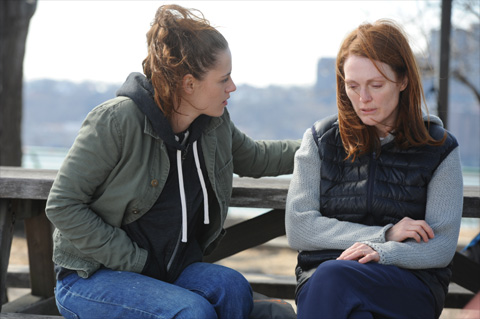
| HOME |
| NERVE |
| REVIEWS |
| ARCHIVE |
| EVENTS |
| LINKS |
| ABOUT US |
| CONTRIBUTORS |
| BACK ISSUES |
| CONTACT US |
Still Alice (12A)
 Directed
by Richard Glazer & Wash Westmoreland
Directed
by Richard Glazer & Wash Westmoreland
Picturehouse,
Liverpool
From 5th March 2015
Reviewed by Nick Daly
It would be easy to disregard Still Alice perhaps just as easily as it is to overlook Alzheimer's itself. It's the film that finally granted an Oscar to the long-deserving Julianne Moore, but the negative connotation attached to the Oscar-favored, disease-centric role, combined with the films omission from every award category besides her own, has provoked a sense that her victory is a veil for a somewhat lifetime achievement award, a consolation for the array of sublime performance in her past. But Still Alice, like its subject matter, deserves a closer inspection, not least for the fact that the Academy could've actually awarded Moore for the finest performance of her career.
It's distinctly apparent, however, why Moore is the one component of Still Alice acknowledged by the Academy, since it's a film solely built around and completely hinging on her very presence. Its slight, conventional narrative channeling the decline of a fifty-year-old linguistics professor after a diagnosis of early on-set Alzheimer's has the cheapened, televisual effect of an afternoon film promoting the topical disease of the month. It's a context that Moore almost succumbs to in an early scene, in which she distressingly declares, "I feel like my brain is dying!" before collapsing and wailing into her husband's arms, verging dangerously into melodrama in the process and critically inducing eye-rolls. But it's the first and fortunately last time the film descends into such tragic domain, as other notable scenes, including a conference speech that would compel even the most unresponsive of cinemagoers to applaud ferociously with the screen in front of them, are executed in truly powerful fashion. It's the strength of Moore as an actress that she possesses the ability to elevate a product of such average qualities into something near extraordinary, where even devastatingly cliché scenarios like a retreat to a beachside summerhouse, complete with somber ocean stares, are made tolerable and occasionally quite profound.
It would be unfair, however, to proclaim that Moore is completely unaided. The plot supporting her paces Alice's deterioration flawlessly, even distorting it at one point, utilizing it as a slick device to achieve a true perspective of Alice's inconceivable mindset ("I was looking for this last night," Alice remarks of her phone from a preceding scene. "It was a month ago," her husband replies somberly.) The films subdued direction allows a sensitivity that ensures the subject never feels exploitive, with artful touches such as Alice's blurred reflection staring out of a blank television screen adding further nuances and poignancy to an already layered interpretation. These attributes work blissfully with Moore's delicate portrayal, but it's her underlying rawness and honesty that begs for a bolder and more unrestrained direction to fully exploit her talents and create something truly brilliant.
NERVE supports workers struggling for a living wage.